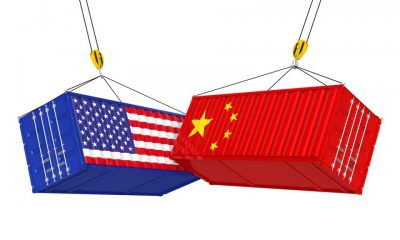Hegemony Will No Longer Pay Off for the US

The administration of US President Donald Trump will reportedly announce new tariffs on about $200 billion on Chinese imports. Meanwhile, Washington has invited Chinese officials to restart trade talks later this month.
While Washington extends a carrot to Beijing, it is also swinging a stick. It is nothing new for the US to try to escalate tensions so as to exploit more gains at the negotiating table. The unilateral and hegemonic moves by the US will meet firm countermeasures from China.
Against the backdrop of successive US offensives in the trade war, China will not just play defense. Nowadays economic and trade relations between China and the US are so closely connected that they will not be easily broken by unilateral hegemony. China will choose the most feasible means as countermeasures.
The trade war occurs at the 40th anniversary of China’s reform and opening-up. It is not only a challenge to the most important bilateral relationship in international politics of the past 40 years, but also a test for China to shape this relationship.
China has never taken this trade war as an interim one, but a protracted one. The trade war launched by Washington, which targets “made in China” products and the Chinese market, has had a big impact on the global production and supply chain. Global economic prospects dim under unilateral US actions.
China, as a main driving force of the global economy, is able to correct and push the global economy onto the right path. Domestically, China is undergoing steady and solid economic structural adjustments.
On the foreign front, it is accelerating its cooperation network by promoting the Belt and Road initiative. This will not only consolidate China’s ability to withstand the trade war, but also provide more choices for the future global economy.
After several rounds of trade war, China has realized that the US government intends to decrease trade and economic integration of the US and China. The US wants to reduce the challenges from potential rivals with its “make America great again” ambition. Meanwhile, it can adjust its China policy to gain an upper hand in areas such as politics and security.
The US still wants to shape Sino-US relations with its strength and consolidate its hegemony. However, today’s world will not be easily manipulated by hegemony. China will not passively be subject to the US maneuverings, nor will it allow any super power to achieve its end by peremptory means. It’s no longer the time when a country can achieve hegemonic dividends through coercion.
The trade war is in essence a conflict and rivalry between unilateralism and multilateralism. Internal contradictions in international relations have become sharper. The war will not only affect the trajectory of China-US trade relations, but also the existing global trading system rules and reforms. China will strengthen coordination and cooperation with all countries. China will explore ways to safeguard fairness and justice in the global economy, and will support free trade and the multilateral trading system.
*
Note to readers: please click the share buttons above. Forward this article to your email lists. Crosspost on your blog site, internet forums. etc.

